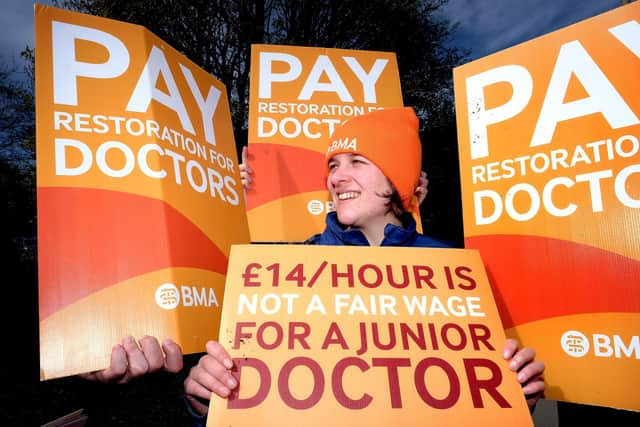NHS strikes: True impact of industrial action yet to be "unmasked" warn health bosses
and live on Freeview channel 276
The true impact of NHS strikes on patients is being “masked” and the number of cancellations and postponements is just the “tip of the iceberg”, NHS representatives have said.
So far, almost 835,000 appointments have been postponed as a result of industrial action since December across the health service in England, according to NHS figures. But in a “worst-case scenario”, industrial action in the NHS could have caused double the number of cancellations than that being reported, the NHS Confederation said.
Advertisement
Hide AdAdvertisement
Hide AdMany hospitals have stopped booking in routine activity on potential strike days to prevent causing more disruption to patients on waiting lists, it said - and making room for rescheduled appointments means that those further down the waiting list also face delays.


After speaking to hospital operations managers and other NHS staff, the NHS Confederation also said the action is heaping increased pressure on the service, hampering efforts to reduce the record backlog of care and leading to a hefty financial cost to the NHS.
Strikes are also causing a significant administration burden, with senior operations managers spending around a third of their time on strike activities. They have called the government’s “business as usual” approach to strike action “dangerous” as it urged ministers to reopen negotiations with doctors.
It comes as NHS England said that coming strikes by junior doctors are likely to cause “significant disruption” to patients. Thousands of appointments, operations and procedures are likely to be postponed as a result of the four-day strike, which starts at 7am on Friday.
Advertisement
Hide AdAdvertisement
Hide AdMeanwhile, NHS leaders highlighted not being able to use agency workers to cover striking medics.
Professor Sir Stephen Powis, said: “This latest round of junior doctors strikes will again significantly disrupt services for patients and the additional challenge this time is that organisations are unable to use agency workers to cover staff out on strike.
“It is also a period of time where NHS staff often take annual leave, so there are already gaps in the workforce. We will continue to prioritise emergency care, but it inevitably means that many thousands of appointments will need to be postponed.”
Matthew Taylor, chief executive of the NHS Confederation, said: “Industrial action damage control has become a dangerous ‘business as usual’ for the NHS – the very situation we warned the government to avoid – and nine months into strike action we are as far away from a solution for doctors as we have ever been.
Advertisement
Hide AdAdvertisement
Hide Ad“The long-term impact of strike action is starting to be felt. Some leaders have told us that staff have had to experience understandable frustrations from patients who have had their procedures cancelled, often multiple times. We fear this might get worse before it gets better, as the number of cancellations due to industrial action will soon reach one million.
“This is a huge number, but we know this is the tip of the iceberg as the official figures don’t fully take into account all the planned elective activity that would otherwise have been delivered.
“Our members have suggested that these cancellations may actually be having a two for one effect as when these operations are rearranged, they are knocking out other – usually less urgent – operations to accommodate them, meaning that a second patient suffers a further delay to their care.
“But strike data just isn’t recording that so we could actually be seeing, in an absolute worst-case scenario, industrial action causing double the number of cancellations than what is being reported.”
Advertisement
Hide AdAdvertisement
Hide AdDr Robert Laurenson and Dr Vivek Trivedi, co-chairs of the British Medical Association’s junior doctors committee, added: “This dispute should never have gone on so long.
“It has now been almost three months since the government was last willing to talk to junior doctors about their pay.
“Since then, we have stated repeatedly that our door remains open for talks at any time, as long as we could be presented with a credible offer that would address pay erosion of more than a quarter over the last fifteen years.
“Instead of acting responsibly and coming to the table, the government has wasted time by first saying nothing and then having the Prime Minister declare an end to talks without first having stepped into the room with doctors.
Advertisement
Hide AdAdvertisement
Hide Ad“He then adds insult to injury by blaming those same doctors for rising waiting lists. Sooner or later the government will accept that they need to work with doctors rather than against them. We are here to talk when they do.”
The latest round of strike action from British Medical Association (BMA) junior doctors in England will start at 7am on Friday August 11 and end at 7am on Tuesday August 15.
The NHS has urged the public to continue to use 999 for life-threatening emergencies and 111 online for anything non-urgent.
It said GPs and pharmacies are also open and largely unaffected by strikes.
Meanwhile, patients should attend their appointment as usual unless they have been told that it is to be rescheduled.
Comment Guidelines
National World encourages reader discussion on our stories. User feedback, insights and back-and-forth exchanges add a rich layer of context to reporting. Please review our Community Guidelines before commenting.
